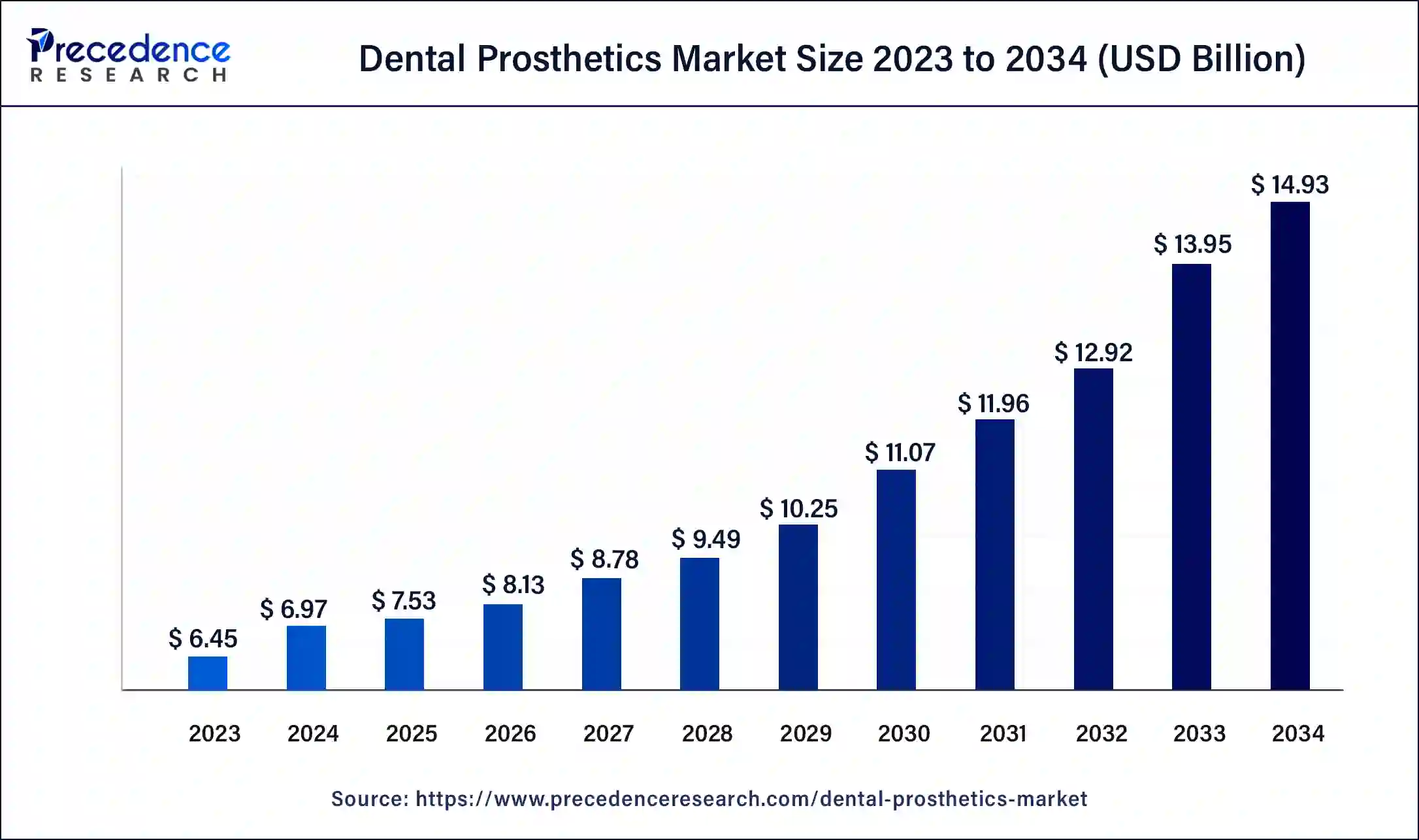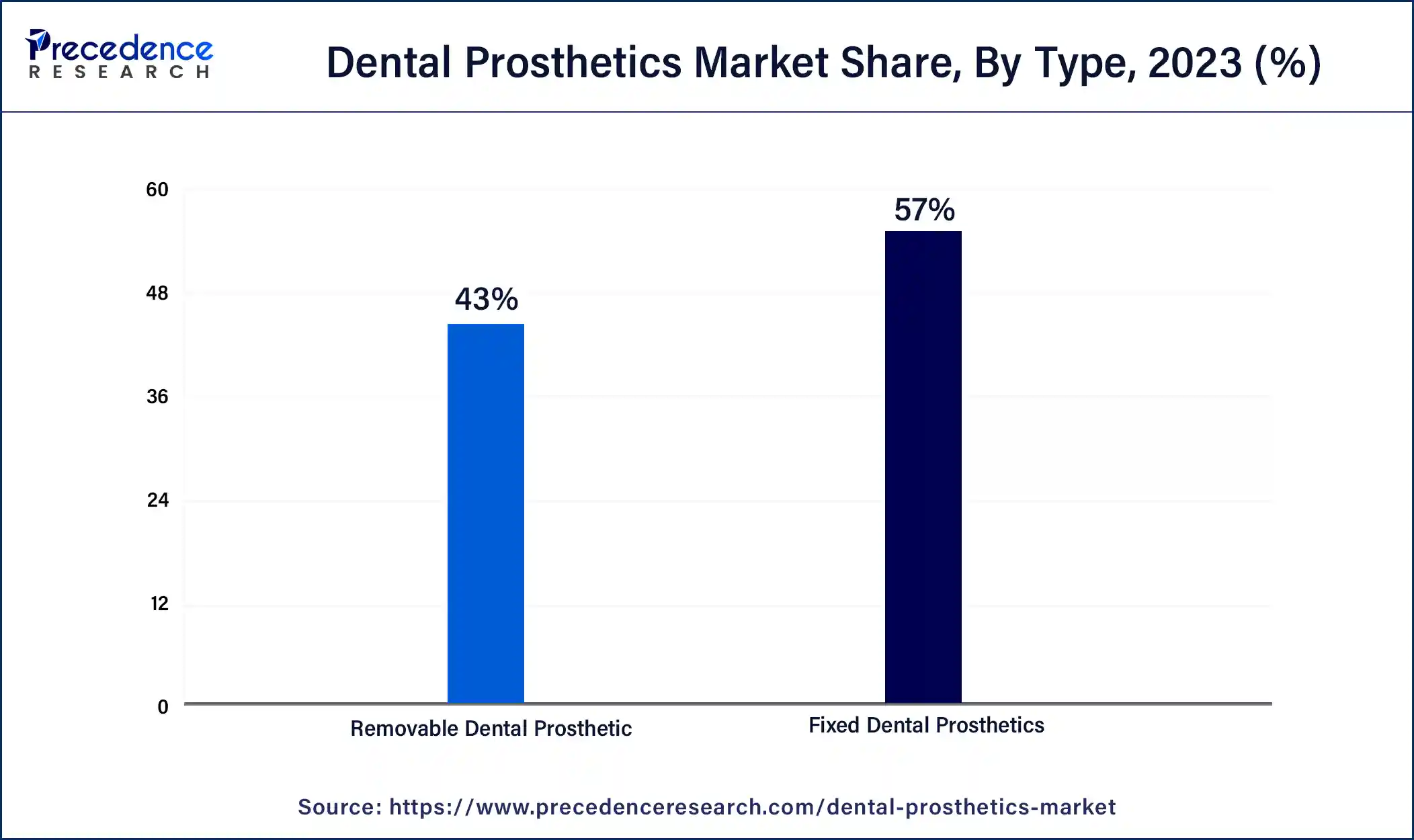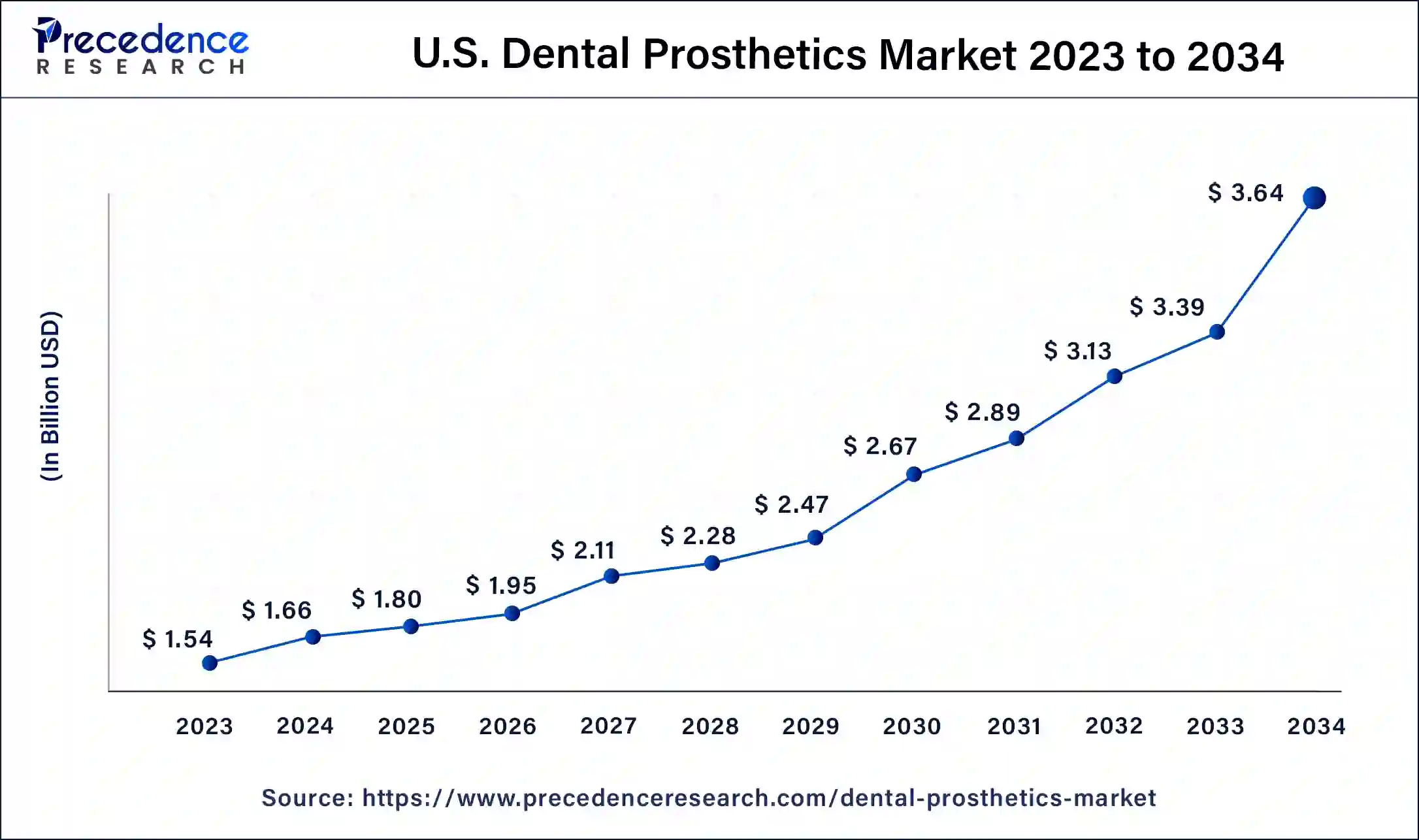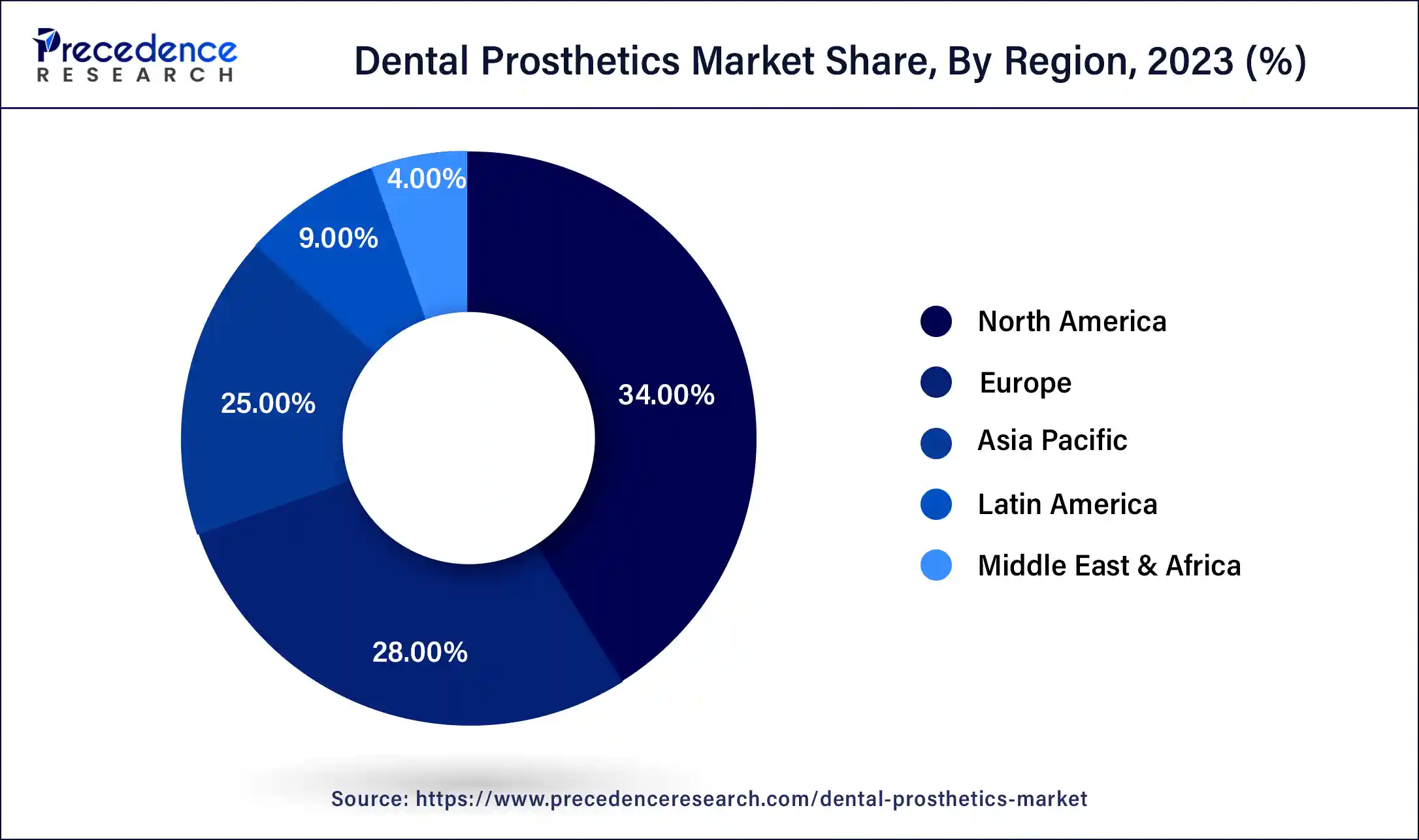What is the Dental Prosthetics Market Size?
The global dental prosthetics market size is calculated at USD 7.53 billion in 2025 and is predicted to increase from USD 8.13 billion in 2026 to approximately 15.94 billion by 2035, expanding at a CAGR of 7.79% from 2026 to 2035. The dental prosthetics market size reached USD 2.37 billion in 2025. An increasing number of people are seeking dental procedures, including prosthetics, to enhance their general well-being as a result of growing knowledge of oral health and the value of dental care.

Dental Prosthetics Market Key Takeaways
- The global dental prosthetics market was valued at USD 7.53billion in 2025.
- It is projected to reach USD 15.94billion by 2035.
- The dental prosthetics market is expected to grow at a CAGR of 7.79% from 2026 to 2035.
- The North America dental prosthetics market size accounted for USD 2.37 billion in 2025 and is expected to attain around USD 5.15 billion by 2035.
- North America has held the largest share of 34% in 2025.
- By region, Asia Pacific is also expected to grow rapidly during the forecast period.
- By product type, the restorative materials segment dominated the market with a 33.50% share in 2025.
- By product type, the aesthetic materials segment is expected to grow at the highest CAGR of 8.40% over the forecast period.
- By application, the prosthodontics segment held a 35.20% market share in 2025.
- By application, the dental implantology segment is expected to grow at the highest CAGR of 8.90% over the forecast period.
- By end user, the dental hospitals & clinics segment dominated the market with a 56.70% share in 2025.
- By end user, the dental laboratories segment is expected to grow at the highest CAGR of 7.80% during the projected period.
What is Dental Prosthetics?
As the world's population ages, dental conditions such as tooth decay, gum disease, and tooth loss are more common, which raises the need for dental prostheses. Dental prostheses are now more comfortable, aesthetically pleasing, and long-lasting because of technological developments in dental materials and production techniques. Dental restorations are now more precisely and effectively designed and fabricated because of innovations like CAD/CAM technology. The demand for cosmetic dental operations, such as dental prostheses, has increased due to growing awareness of oral health and the significance of dental aesthetics. Spending money on procedures to improve their smiles and overall oral look is becoming increasingly common.
Globally, there has been an increase in dental problems due to changes in lifestyle, including tobacco use and bad eating habits. In order to restore oral function and aesthetics, there has been an increased demand for dental prostheses. Growing disposable income levels and economic development in emerging economies have made dental procedures, particularly prosthetic restorations, more accessible to a wider range of people. In developed nations, strict regulations and standards guarantee the quality and safety of dental prostheses, but they can also make it difficult for new manufacturers to enter the market particularly smaller ones. The COVID-19 pandemic first caused lockdowns and limits on elective surgeries, which resulted in a backlog in dental prosthesis treatments. However, the dental prosthetics market steadily rebounded as dental clinics reopened with safety procedures in place.
How is AI contributing to the Dental Prosthetics Industry?
The dental prosthetics Industry receives AI support through its capability to automate CAD design for intraoral scans, which results in accurate three-dimensional anatomical representation, optimal material selection, precise shade determination, efficient implant development, accurate treatment outcome predictions, and time-saving chairside procedures that allow doctors to control and customize their entire restoration process.
Dental Prosthetics Market Growth Factors
- Dental problems like tooth decay, periodontal infections, and tooth loss are more common as the world's population ages, which raises the need for dental prostheses.
- An increasing number of people are seeking dental treatments, including prosthetic alternatives, to improve their smiles and oral health as a whole due to growing awareness of oral health and the value of dental aesthetics.
- Dental conditions that frequently cause tooth loss or damage that needs to be restored, such as dental caries, periodontal diseases, and trauma, increase the need for dental prostheses.
- The need for the dental prosthetics market is being driven by the development of medical tourism, especially for dental operations, as people look for more affordable treatment choices in nations where dental care is often less expensive.
- Advancements in dental materials, including metals, polymers, and ceramics, have improved the prosthesis' resilience, appearance, and biocompatibility, which has resulted in a rise in their use.
- A growing number of patients are choosing aesthetic dentistry operations to improve the appearance of their smile and face, which is driving up demand for the dental prosthetics market.
- Dental prosthetics are subject to favorable laws and standards that guarantee product safety, efficacy, and quality, which stimulates dental prosthetics market expansion by establishing consumer confidence.
Market Outlook
- Industry Growth Overview: Inspired by the aging population, rising tooth loss rates, and faster digital workflow and additive manufacturing technology use.
- Major Investors: Dentsply Sirona, Straumann Group, Envista Holdings, Zimmer Biomet, Henry Schein, and 3M are still the main sources of growth.
- Startup Ecosystem: New startups develop AI-based printing and customization with minimal intrusion, which complement the existing manufacturers in the form of strategic alliances.
Market Scope
| Report Coverage | Details |
| Market Size by 2035 | USD 15.94Billion |
| Market Size in 2025 | USD 7.53 Billion |
| Market Size in 2026 | USD 8.13 Billion |
| Growth Rate from 2026 to 2035 | CAGR of 7.79% |
| Largest Market | North America |
| Base Year | 2025 |
| Forecast Period | 2026 to 2035 |
| Segments Covered | By Type, By Material Type, and By End-user |
| Regions Covered | North America, Europe, Asia-Pacific, Latin America and Middle East & Africa |
Market Dynamics
Driver
Demand for aesthetic dentistry
Individuals are becoming more aware of how they look and how much a lovely smile may improve one's entire appearance. They are, therefore, looking for cosmetic dentistry procedures to make their smiles look better. Dental prostheses are becoming more and more necessary as the population ages in order to replace lost or broken teeth. However, unlike in the past, when the elderly population's main priority was practicality, modern prosthetics must also seem natural and attractive. In the dental prosthetics market, the development of more realistic prostheses that closely mimic real teeth are the result of advancements in dental materials. When compared to traditional choices, materials like porcelain and zirconia give superior aesthetic results and are incredibly durable.
Restraint
Dental anxiety and fear
Dental dread and anxiety have a big role in the dental prosthetics market. A lot of people get scared or anxious when they go to the dentist, especially when it comes to dental prostheses like crowns, bridges, or dentures. Anxiety can have several causes, such as a general apprehension about dental operations, a dread of pain, or unpleasant memories from the past. Furthermore, digital dentistry's technology breakthroughs have made prosthetic production processes more accurate and productive. Computer-aided design and manufacturing (CAD/CAM) techniques facilitate the production of highly precise and personalized dental prostheses with minimal discomfort to the patient.
Opportunity
Increasing dental awareness
In the dental prosthetics market, educational programs are launched to inform dentists on the most recent developments in dental prostheses, including novel materials, technology, and methods. Workshops, seminars, and online courses could be a part of this. Working along with dentistry schools to include dental prosthesis courses in their curricula. This guarantees that aspiring dentists have a thorough understanding of the options accessible to their patients. Providing dental technicians and dentists with professional development opportunities to advance their knowledge in the field of dental prostheses. Programs for certification and practical training may fall under this category. Organizing conferences and continuing education programs centered on developments in dental prostheses. These gatherings can provide forums for information exchange, networking, and presenting the most recent advancements in the industry.
Segment Insights
Type Insights
The fixed dental prosthetic segment held the largest share of the dental prosthetic market in 2025. Under the segment, the crowns sub-segment held the largest share of the dental prosthetics market and is expected to hold this position during the forecast period. These crowns blend the organic look of porcelain with the durability of metal. They are strong and resilient to chewing and biting pressures. However, occasionally, the metal behind the porcelain can be seen as a black line close to the gum line, which can be very unappealing.
These crowns are completely composed of ceramic material, which imitates the translucency of natural teeth, making them aesthetically pleasing. They are a well-liked option for restorations of front teeth. All ceramic crowns can be used by people who are allergic to metals and are biocompatible. One kind of ceramic material that is renowned for its sturdiness and strength is zirconia. Zirconia crowns are a good option for front and back tooth restoration because of their strength and outstanding looks.

The removable dental prosthetic segment is observed to grow at a significant rate during the forecast period. The denture sub-segment is expected to obtain a significant share under this segment. When all of the teeth in the upper or lower jaw, or both, are absent, these are utilized. They are usually detachable and replace all the teeth. Dental implants that have been surgically inserted into the mandible hold these dentures in place. Compared to conventional removable dentures, they provide more stability and stop bone loss. These are inserted right away following the extraction of the natural teeth. Throughout the healing process, they assist the patient in continuing to speak and look normally. However, when the gums shrink and heal, modifications can be required. Similar to dentures supported by implants, overdentures can also be supported by the natural teeth that are still present. Compared to conventional detachable dentures, they offer more stability and support.
Material Type Insights
The ceramics segment held a significant share of the market. Ceramics as a material, is widely used for prosthetic dentistry owing to their clinical properties and high strength. In addition, biocompatibility and good combination of chemical stability often acts as a notable factor for the application of ceramics. The rising rate of dental restoration, especially in younger people, is observed to promote the expansion of the segment. Moreover, the rising demand for aesthetically pleasing dental prosthetic products is expected to support the segment's growth.
End-user Insights
The dental hospital & clinics segment held the largest share of the dental prosthetics market in 2025 and is expected to maintain its dominance during the forecast period. Mayo Clinic, which is renowned for providing comprehensive healthcare, probably provides cutting-edge dental prosthesis procedures in addition to its other medical disciplines. Dental prosthesis services are offered by affiliated hospitals or clinics at several colleges that house dental schools. ClearChoice is a prominent player in the dental prosthetics market because of its expertise in full mouth restoration and dental implants.
Prosthetic dentistry is one of the many dental services provided by the extensive nationwide network of Aspen Dental clinics. This business primarily serves a portion of the market looking for reasonably priced prosthetic treatments by offering dentures and dental implants. Prosthetic dentistry services are provided by countless private dental clinics and practices across the globe, ranging from solo practices to larger group practices.
In the dental prosthetics market, the dental laboratories segment is expected to show significant growth during the forecast period. Dental laboratories that specialize in producing prosthetic devices such as crowns, bridges, dentures, and implants make up the dental prosthetics market. For individuals in need of restorative or cosmetic dental procedures, these labs are an essential source of dental solutions. This business is well-known for its cutting-edge dental technology and provides a wide variety of prosthetic tooth options. Offers a wide range of dental prosthetic options, including crowns, bridges, and implants, and specializes in implantology. Offering a wide range of dental prosthesis products and services, this dental laboratory is among the biggest in the world.
The dental hospitals & clinics segment dominated the market with a 56.70% share in 2024. Mayo Clinic, which is renowned for providing comprehensive healthcare, probably provides cutting-edge dental prosthesis procedures in addition to its other medical disciplines. Dental prosthesis services are offered by affiliated hospitals or clinics at several colleges that house dental schools. ClearChoice is a prominent player in the dental prosthetics market because of its expertise in full mouth restoration and dental implants.
The dental laboratories segment is expected to grow at the highest CAGR of 7.80% during the projected period. Dental laboratories that specialize in producing prosthetic devices such as crowns, bridges, dentures, and implants make up the dental prosthetics market. For individuals in need of restorative or cosmetic dental procedures, these labs are an essential source of dental solutions. This business is well-known for its cutting-edge dental technology and provides a wide variety of prosthetic tooth options.
Product Type Insights
The restorative materials segment dominated the market with a 33.50% share in 2025. The dominance of the segment can be attributed to the increasing incidence of dental diseases and innovations in materials and technology. In addition, a surge in the elderly population results in more dental issues, which directly increases the demand for restorative materials like crowns, bridges, and implants.
The aesthetic materials segment is expected to grow at the highest CAGR of 8.40% over the forecast period. The growth of the segment can be credited to the increasing cosmetic dentistry demand, coupled with the increase in dental tourism, especially in emerging markets. Also, growing interest in aesthetic dental treatment is a major driver, as it enhances the appearance of people's smiles.
Application Insights
The prosthodontics segment held a 35.20% market share in 2025. The dominance of the segment can be linked to the growing demand for both restorative and cosmetic dentistry, along with the rapid technological innovations in digital dentistry, such as CAD/CAM systems. Moreover, the expansion of dental tourism in various regions is also impacting positive segment growth further.
The dental implantology segment is expected to grow at the highest CAGR of 8.90% over the forecast period. The growth of the segment can be driven by rising preference for cosmetic and aesthetic dentistry, coupled with the rapid development of advanced materials and procedures. A surge in the number of older adults adopting restorative dental treatments is contributing to segment expansion.
Regional Insights
What is the U.S. Dental Prosthetics Market Size?
The U.S. dental prosthetics market size reached USD 1.80 billion in 2025 and is expected to be worth around USD 3.90 billion by 2035 at a CAGR of 8.04% from 2026 to 2035.

North America held the largest share of the global dental prosthetics market in 2025and is expected to continue doing so during the forecast period. Numerous cutting-edge dental technology companies that are constantly developing new materials, manufacturing processes, and digital dentistry solutions are based in Europe. More accurate, long-lasting, and aesthetically beautiful dental prostheses are the result of these developments. Dental problems such as tooth decay, gum disease, and tooth loss are still common, particularly in the elderly population. This creates a demand for dentures, bridges, and implants, among other dental prosthetic treatments.
North America's dental prosthetics market is governed by stringent laws that guarantee the goods' effectiveness and safety. It is imperative that manufacturers and suppliers operating in this industry adhere to CE marking regulations as well as other criteria.
U.S. Dental Prosthetics Market Trends
The U.S. has been a leader in terms of digital chairside protocols, extensive use of CAD CAM, and high demand for implant-supported restorations. There is rapid standardization with the introduction of DSOs, increasing the use of high-end prosthetics, customized abutments, and single-visit restorative solutions in extensive clinic systems.

Asia Pacific is also expected to grow rapidly during the forecast period. This development is attributed to a number of factors, including a growing elderly population, rising disposable income, greater awareness of oral health, and advancements in dental technology. Key nations that have contributed significantly to the expansion of the dental prosthetics market in the Asia Pacific area are China, Japan, India and South Korea.
As oral problems are becoming more common in these nations and because aesthetic dental operations are becoming more and more important, there is a growing demand for dental prostheses. Furthermore, the dental prosthetics market has undergone a revolution thanks to developments in dental materials and technology, including digital imaging, 3D printing, and CAD/CAM (computer-aided design/computer-aided manufacturing) systems.
China Dental Prosthetics Market Trends
China presents growth potential at an unprecedented rate due to an aging population, increasing purchasing power, and changing purchase systems. The growth is inclusive of imported implants and new local producers, and it provides a competitive environment of low-cost and high precision solution of prosthetics among the growing private dental clinics.
What Are the Driving Factors of The Dental Prosthetics Market in Europe?
Europe is expected to grow at a notable rate during the forecast period. Europe enjoys the advantage of a high prevalence of oral diseases, high dental expenditure, and unending material innovation. High-end prosthodontic studies, high-quality restorative choices, and developed laboratory ecosystems drive consistent demand for digitally made prostheses and precision-based workflows in clinics and laboratories.
Germany Dental Prosthetics Market Trends
Germany is characterized by a high level of zirconia implementation, accuracy in production, and extensive implementation of AI in diagnosis. The high demand for CAD CAM custom abutment in the market leads to a focus on accuracy, biocompatibility, and high-quality restorative results, accompanied by the use of technologically advanced dental laboratories.
Value Chain Analysis of the Dental Prosthetics Market
- R&D: Preliminary phase that entails discovery, preclinical trials, and intellectual property development, in support of the innovations in prosthetic materials.
Key Players: Institut Straumann AG, Dentsply Sirona, 3M, Ivoclar Vivadent, Envista Holdings - Clinical Trials and Regulatory Approvals: The assurance of safety and functioning with negotiating obligatory regulatory frameworks in the case of the legal introduction into the market.
Key Players: Nobel Biocare, Straumann Group, ZimVie Inc., BioHorizons - Formulation and Final Dosage Preparation: Transformation of active materials into stable, scalable forms of prosthetics that are consistent and of quality.
Key players: VITA Zahnfabrik, Merz Dental, Kulzer, Argen Corporation, GC Corporation - Packaging/Serialization: Standardized packaging that allows counterfeiting to be prevented and provides a traceable identifier that assists with regulatory compliance.
Key Players: Syrma SGS Technology (RFID), Nobilium, Gerresheimer - Delivery to Dental Prosthetic Hospitals, Pharmacies: Sterile products are delivered to the clinic and laboratory cost-effectively.
Key Players: Henry Schein, Patterson Companies, Glidewell Laboratories, National Dentex Labs
Dental Prosthetics Market Companies
- Institut Straumann AG: Offers complete implant systems, prosthetic components, biomaterials, and integrated digital solutions based on long-term, predictable tooth replacement results.
- Envista Holdings Corporation: Offers digital platforms and clear aligners, as well as the delivery of implant systems, to support complete end-to-end prosthetic processes via Nobel Biocare and Ormco.
- DENTSPLY Sirona, Inc.: Provides offerings of sophisticated implants, CAD CAM systems, and equipment that facilitate the complete integration of the prosthetic and restorative treatment processes.
Other Major Key Players
- 3M Company
- ZimVive Inc.
- Henry Schein, Inc.
- Mitsui Chemicals Inc.
Recent Developments
- In October 2025, Carbon has launched FP3D, a revolutionary flexible removable partial denture resin. This innovative dental material features dual-cure chemistry, offering superior durability, translucency, accuracy, flexibility, and aesthetics, along with cost benefits compared to conventional methods.
(Source: https://www.medicaldesignandoutsourcing.com ) - In July 2025, Yuhan Corp. and Shinhung formed a joint venture for dental implants, launching the "Yuhan Evertis" brand. They will collaborate on planning, marketing, and sales of dental devices and pharmaceuticals.(Source:https://www.koreabiomed.com )
- In February 2024, Japan saw the launch of TSX Implant by ZimVie Inc., a leading global life sciences company in the dentistry and spine sectors. Japan is a very important strategic market for ZimVie, being the largest dental implant market in APAC and the sixth largest worldwide. With the introduction of TSX in Japan, the business can now take on premium market leaders in the dental implant industry head-to-head.
- In October 2023, With the release of OnX Tough 2, the first and only 3D printing resin with US Food and Drug Administration (FDA) 510(k) clearance for fixed, implant-supported denture prosthetics, SprintRay, a leader in digital dentistry and dental 3D printing solutions, has taken a significant step forward for the dental industry.
Segment Covered in the Report
By Product Type (Revenue: US$ Billion & Volume: Tons)
- Restorative Materials:
- Direct Restorative Materials:
- Composite Resins (e.g., nanofill, microfill, hybrid, bulk-fill, flowable)
- Glass Ionomer Cements (GIC)
- Resin-Modified Glass Ionomer (RMGI)
- Amalgam
- Indirect Restorative Materials:
- Ceramics (e.g., Zirconia, Lithium Disilicate, Feldspathic porcelain)
- Metal Alloys (e.g., noble metals like gold, base metal alloys like cobalt-chromium, titanium)
- Polymers (e.g., acrylics, high-performance polymers)
- Direct Restorative Materials:
- Dental Cements:
- Permanent Cements
- Temporary Cements
- Luting Cements (e.g., zinc phosphate, glass ionomer, resin cements)
- Liner and Base Materials (e.g., calcium hydroxide, zinc oxide eugenol)
- Impression Materials:
- Elastomeric Impression Materials (e.g., Vinyl Polysiloxane (VPS), Polyether, Polysulfide)
- Hydrocolloid Impression Materials (e.g., Alginate, Agar)
- Gypsum Products
- Bonding Agents and Adhesives:
- Generational Systems (e.g., 1st generation to 8th generation)
- Etch & Rinse (Total-etch) Systems
- Self-etch Systems
- Universal Bonding Agents
- Endodontic Materials:
- Root Canal Filling Materials (e.g., Gutta-percha, sealers)
- Irrigants and Disinfectants (e.g., sodium hypochlorite, EDTA)
- Post and Core Materials
- Prophylaxis and Preventive Materials:
- Sealants (e.g., resin-based, glass ionomer-based)
- Fluoride Varnishes and Gels
- Finishing and Polishing Materials
- Aesthetic Materials:
- Whitening Agents (e.g., gels, strips)
- Veneer Materials (e.g., porcelain, composite)
By Application (or Procedure)
- Prosthodontics:
- Crown and Bridge
- Dentures (e.g., full, partial, fixed)
- Implants
- Inlays and Onlays
- Dental Implantology:
- Implant Fixtures
- Abutments and Prosthetic Components
- Bone Graft Substitutes and Membranes
- Surgical Guides
- Restorative Dentistry:
- Direct Restorations (e.g., fillings)
- Indirect Restorations (e.g., crowns, inlays)
- Orthodontics:
- Brackets (e.g., metal, ceramic, self-ligating)
- Archwires
- Clear Aligners
- Retainers
- Endodontics:
- Root Canal Therapy
- Root-end Surgery
- Periodontics:
- Periodontal Surgery (e.g., gum grafts, bone regeneration)
- Maintenance and Care
By End-User
- Dental Hospitals and Clinics:
- General Dentistry Practices
- Specialty Clinics (e.g., orthodontic, endodontic)
- Hospital-based Dental Departments
- Dental Service Organizations (DSOs)
- Dental Laboratories:
- Commercial Labs
- In-house Labs (within a clinic or group practice)
- Milling Centers (for CAD/CAM materials)
- Academic and Research Institutes:
- Dental Schools and Universities
- Biomedical and Materials Research Labs
By Geography
- North America
- Europe
- Asia-Pacific
- Latin America
- Middle East and Africa
For inquiries regarding discounts, bulk purchases, or customization requests, please contact us at sales@precedenceresearch.com
Frequently Asked Questions
Tags
Ask For Sample
No cookie-cutter, only authentic analysis – take the 1st step to become a Precedence Research client
 Get a Sample
Get a Sample
 Table Of Content
Table Of Content




 sales@precedenceresearch.com
sales@precedenceresearch.com
 +1 804-441-9344
+1 804-441-9344
 Schedule a Meeting
Schedule a Meeting